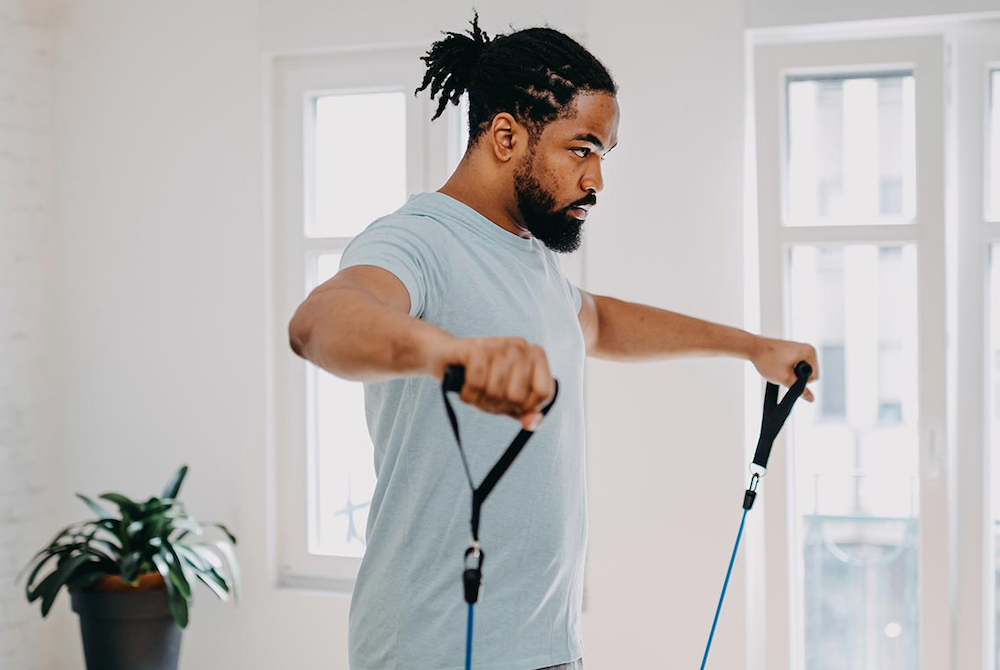
How To Enhance Your Running Performance
July 11, 2023
With summer now in full swing, lots of us are hitting the track, the streets and the trails to get and stay fit.
 Whether you run marathons or prefer a quick lap around the block, there are many ways to adjust your running routine to get the most out of your workout.
Whether you run marathons or prefer a quick lap around the block, there are many ways to adjust your running routine to get the most out of your workout.
"It's not uncommon for runners to get into a regular running routine," says Jamie Schwab, an athletic trainer at Henry Ford Health. "They'll find a comfortable pace and stick with it, often even doing the same route."
Unfortunately, doing the same run day after day not only leads to boredom, but it can also prevent you from reaching your full potential.
5 Tips To Run Smarter
It’s no secret that running is tough on the body. In fact, runners frequently develop muscle imbalances that make the body work harder. But you can take steps that can help you improve your run, maximize efficiency and get the most out of your running workout. Here's how:
1. Listen to your body: Whether you're a seasoned runner or just starting out, pay close attention to what your body is telling you. If your hips and knees are sore, back off. Feeling strong? Run another mile. The key to improving your run is to gradually increase distance and intensity over time. At first, you may only be able to handle a 10- or 15-minute jog. But if you keep at it, you'll be running for 30 minutes straight in no time.
2. Get the right footwear: If you're not a competitive runner, you might think any pair of running shoes will do. In reality, properly fitted running shoes not only enhance your performance but also reduce your risk of injury. Find a running store that can analyze your form and recommend shoes based on your unique gait and foot strike.
3. Pay attention to your target heart rate: Your target heart rate is 220 minus your age. Once you hit that rate during your run, you're working at maximum capacity. Don't want to invest in a heart rate monitor or be bothered with another tracking device? You're probably hitting the zone if you can still carry on a conversation during your run.
4. Focus on strength: If you're an avid runner but you aren’t strength training, you're setting yourself up for injury. "You're asking your body to do a lot during a run," Schwab says. "Weak glutes or hips add stress to your knees and ankles." Want to stabilize your run? Pay special attention to your core muscles. Solid strength training exercises include lunges, planks, squats and pushups.
5. Keep it interesting: Doing the same running routine day after day can be exhausting. Break out of your comfort zone by trying a different route, playing with your pacing, or running stairs or hills. You might even incorporate plyometric activities into your run. These explosive motions — hopping, skipping and jumping — help build power, strength and performance.
Running Safe
Eating well and getting regular exercise are key to enhancing overall health. Plus, a fit body is better equipped to avoid and battle infection. Running can also protect your sanity.
"Running is a great escape for many exercise enthusiasts," Schwab says. "Many people find they not only feel physically healthier, but their mental and emotional health also gets a boost."
The caveat: When you're running, you're placing double or triple your body weight on one side of your body at a time. So it's critical to pay attention to what shape your body is in before you take to the track. A few questions to ask yourself:
- Am I in good cardiovascular shape?
- Am I recovering from shin splints, knee injuries or hip problems?
- Am I at risk of falls?
- Am I suffering from osteoporosis?
It’s always important to check with your doctor before making changes in your exercise regimen. If running isn't appropriate for you, plenty of other activities, such as swimming, hiking and biking, can get your heart pumping.
To find a sports medicine specialist at Henry Ford, visit henryford.com/sports or call 1-800-436-7936.
Jamie Schwab, AT, ATC, SCAT, CSCS, is an athletic trainer with Henry Ford Sports Medicine and works with student athletes at Edsel Ford High School. She is a National Strength and Conditioning Association certified strength and conditioning specialist.

How To Warm Up Correctly Before Playing Different Sports
July 10, 2024
When you see professional athletes gearing up to race or getting ready to take the field, you’ll notice that they’re always in motion. That’s because they are warming up in preparation for going all out.
 And there’s a good reason why you’ll never see a pro go straight from the bench into a full sprint. “You need to allow your muscles to gradually accept the demands of your activity,” says Jennifer Burnham, a certified athletic trainer at Henry Ford Health. “Otherwise you risk causing an injury.”
And there’s a good reason why you’ll never see a pro go straight from the bench into a full sprint. “You need to allow your muscles to gradually accept the demands of your activity,” says Jennifer Burnham, a certified athletic trainer at Henry Ford Health. “Otherwise you risk causing an injury.”
Why You Should Warm Up
As the name implies, a warmup is a series of movements designed to warm up your muscles. “You want to increase blood flow to your muscles and loosen up and lubricate your joints,” says Burnham. “And you need to do it gradually, so that your body has time to adapt to the increasing intensity.”
Warming up involves more than just stretching. According to Burnham, studies have actually shown that holding a static stretch when muscles are cold can decrease performance. “Instead, before activity you want to do a dynamic warmup that incorporates movement as well as some gentle stretching."
Your warmup only needs to take 5 to 10 minutes. When deciding what to do, think about the movements you’ll be doing in your activity and which muscles and joints are most involved. Then choose movements that slowly get them warmed up and primed for more intense action.
How To Warm Up For Different Activities
No matter your sport, the warmup before your workout should include some exercises to activate and engage your core (the abdominal and back muscles). “Waking up those muscles helps decrease injury potential,” says Burnham. She suggests incorporating bridges and mini squats (no deeper than 45 degrees) into your warmup routine. To do a bridge, lie on your back, knees bent, feet flat on the floor. Tighten your stomach muscles and squeeze your butt as you lift your hips up to form a straight line from knees to shoulders.
The rest of your warmup can be more specific to muscles and movements of your planned activity.
Running
Before a run, or even a jog, you want to warm up all the muscles and joints from the waist down.
- Rotate your hips (lift your knee up and do some circles in both directions to move the joint) and ankles (circle one foot at a time both clockwise and counter-clockwise).
- Get powerful muscles like your glutes and quads ready with high knees and butt kicks.
- Walk on your toes and then on your heels to warm up shin and calf muscles.
- When you’re ready to run, start off slowly and gradually increase your speed.
Racquet sports
You still need to warm up your lower body using the same moves as the running warmup. But you’ll want to add in others specific to the upper body movements of tennis, pickleball or other racket sports.
- Warm up shoulders with big arm circles both forwards and backwards
- Circle your hands in both directions to get wrists ready for action
- Lunge forward and rotate your upper torso to increase your spine mobility
Basketball, soccer and football
You want to make sure your lower body has time to adapt to the demands of sports that require bursts of sprinting and quick shifts of direction. Your warmup should gradually increase in speed and intensity as you move your body in all directions:
- Side shuffles while swinging your arms (shuffle in both directions)
- Grapevines in both directions
- Skip forward, lifting knees high, then skip backward
Swimming
Prepping your body for a swimming workout means warming up your arms, shoulders and upper back.
- Circle arms backwards and forwards
- Use a light resistance band to do shoulder rows
- Use a light resistance band or light dumbbell and lift straight arms up to shoulder height in front and to your sides
- Start with an easy tempo freestyle swim before going into more dynamic strokes like butterfly
Jennifer Burnham is an athletic trainer who sees patients at the Henry Ford Center for Athletic Medicine in Detroit.
To find a sports medicine provider at Henry Ford Health, visit henryford.com/athletes or call 313-651-1969.

